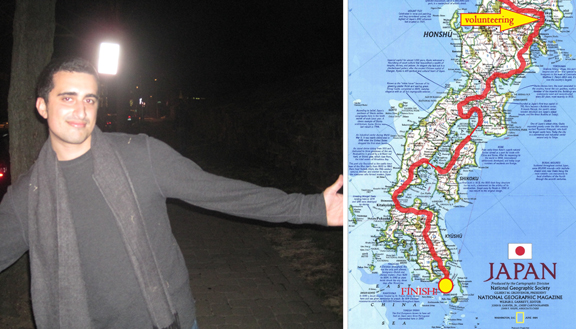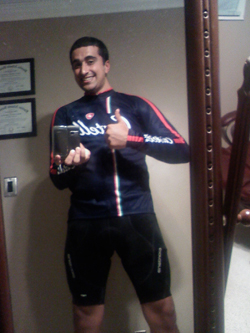Fifteen years ago, my friend observed a Passover in Japan while I was in Russia, this is his story:
It was a few weeks before Passover 1997. Rabbi Moshe Kotlarsky, of Chabad World Headquarters in Brooklyn, requested of my colleagues to travel to the Far East and conduct public Passover Seder for the Jewish community living in the remote city of Kobe. Our journey was to go to Japan; and the numerous encounters with hundreds of Jews residing in that part of the world remains etched in my heart.
My colleague, Moshe Leiberman (today a Rabbi in Boston), supervised the meticulous procedures of koshering the Synagogue kitchen for Passover and preparing the food for the Seder. We did not know how many people to expect; there are wandering Jews to be found in every corner of Japan. To our astonishment, our first public Seder attracted close to 200 Jews, most of them from very secular backgrounds, some have not attended a Passover Seder in decades.
The energy was great. We sang, danced, ate the crunchy matzah and drank the tasty wine. The guests were into it, eating up the discussions as much as the delicious meal.
In the middle of the Seder, I was searching for words to describe my sentiments. My memory brought forth a moving Chassidic tale — one of my personal favorites — about the holy Rebbe (spiritual master) of Barditchov. Here it goes …
A drunkard’s seder
Rabbi Levi Yitzchak of Barditchov (1740-1810) was one of the great spiritual masters of his generation. One Passover, following an emotionally charged Seder, the Rebbe was told from heaven that Mosheleh, the water carrier’s, Seder was superior to his. “This year,” he was informed from above, “G-d’s most lovable Seder was that of the water-carrier of Barditchov.”
The next day after services, the Rebbe’s disciples went up to Mosheleh the water carrier and asked him to come see the Rebbe. Mosheleh came before the Rebbe, and he began to cry bitterly. He said, “Rebbe, I’ll never do it again. I’m so sorry; I don’t know what came over me.” The poor man was devastated. The Rebbe said, “Listen, my dear Jew, don’t worry so much; just tell us what you did last night.”
Here we must interrupt the story for a moment. It is well known that, generally, intoxication and alcoholism are viewed in Judaism as repulsive and destructive. Yet, our dear Mosheleh was orphaned at a young age and was miserably poor. He sadly succumbed to the temptation of alcohol as a way to deal with his agony and stress. Essentially, Mosheleh was a good and innocent man, a G-d fearing individual and a pure heart, but this temptation, unfortunately, got the better of him, and he drank often.
The “problem” is that on Passover you can’t drink whiskey. So Mosheleh had a tremendous idea: He’ll stay up the whole night before Passover and drink an amount of whisky that would keep him “high” for eight days straight, throughout the entire Passover holiday.
This Moshe did: When the night before Passover arrived, he drank and drank, until the minute when you must stop eating Chamatz (leaven) on the morning before Passover. When the clock struck 20 minutes after nine, he took his last “L’chayim” and he was out cold.
Seder night arrived. His wife came to wake him and said, “Mosheleh, it’s really not fair. Every Jewish home has a Seder. We have little children, and we are the only ones who don’t have a Seder.”
Mosheleh gazed at the Rebbe of Barditchov and continued relating his tale: “By then, did I regret that I drank so much the night before! Did I regret it! I would have done anything not to be drunk. But I couldn’t help it. So I said to my wife: ‘Please wake me up in an hour. I just can’t get it together yet.’ My wife kept waking me every hour, and then every half-hour. Then, suddenly, she came to me and said, ‘Moshe, in 20 minutes the Seder night is gone and the children are all sleeping. Shame on you. You are a disgraceful father and husband!’
“Gevald! I was so devastated,” Mosheleh told the Rebbe. “Here, my children are precious beyond words and I am a lousy alcoholic father, I didn’t even give them a Seder. I realized how low I have fallen, how my addiction destroyed my life and my relationships, how I sold my soul to the devil of alcohol. So, with my last strength, I got out of bed and sat down at the Seder table. I said to my wife, ‘Please, call our holy children.’
“She called the children and I said to them, ‘Please sit down very close to me, I have to talk to you. I want you to know, children, that I am so sorry that I drank. I am so sorry that I am a drunkard. If my drinking can make me not have a Seder with you, then it’s not worth it.’ I said to my children, ‘I swear to you, that I’ll never drink again in my life. But, right now, it’s Seder night, so let me just tell you the Passover story in a nutshell.’”
Mosheleh said to the Rebbe, “You know, I was still drunk, and I barely know how to read Hebrew. But, I tried my best. I said, ‘Children, I want you to know that G-d created heaven and earth in seven days. Then Adam and Eve ate from the Tree and were thrown out of Paradise. Since then, everything went downhill: There was a flood, there was a tower of Babel — that was as much as I knew.
Mosheleh said to the Rebbe, “Then came Abraham and Sarah. They began fixing the world again. Abraham and Sarah, Isaac and Rebecca, Jacob and Rachel and Leah and their 12 holy sons. Then Pharaoh made slaves out of us, and tonight, G-d took us out from Egypt.
“’My Sweet children, now we are also in exile. And I want you to know that the same G-d who took us out from Egypt is still alive and present and very soon He will liberate us from this exile too.’
“I turned to G-d, and said: ‘Father in heaven, thank you so much for taking us out of Egypt. And I beg you, sweetest father, please take us out of our present exile very soon’! Rebbe, I’m so sorry. I couldn’t say anything more because I was still drunk.
“I Took the Matzah, Maror and Charoses situated on the table and ate them. I filled four cups and drunk them one after another, I turned over and I fell asleep again.”
The holy master, Rabbi Levi Yitzchok of Barditchov, was crying bitter tears. He said to his disciples, “Did you hear that? Did you hear that? I wish that one time in my life I should communicate Yiddishkeit (the Jewish spirit) to my children the way Mosheleh the water carrier gave it over to his children Seder night. I wish that once in my life I should converse with G-d like Mosheleh did during his Seder.”
A woman’s tale
I concluded the story and then I said:
“I want you to know that I celebrated many a Seder-night in a very observant Jewish community in New York. Yet I get the feeling that G-d’s most lovable Seder was the one done right here, in Kobe, Japan! Many of us here this evening may be unaware of the detailed Seder rituals and customs, and so many of us may not even know how to read the Haggadah in Hebrew. But, my dearest brothers and sisters, the sincerity and the passion of so many Jews thirsty to reconnect with their inner soul — this I’ve never seen before during a Passover Seder and I thank you for allowing me this special opportunity.”
I felt that the story has stirred up deep emotion in the audience. I could see tears streaming from some people’s eyes. But one woman was sitting at the other end of the room and was weeping profusely. She later approached me and related her personal tale: “I grew up in a very assimilated home,” the woman said. “I know almost nothing about Judaism. I’m living here in Japan for more than 20 years, working as a school teacher and involved in the mystical disciplines of the Far-East.”
She related to me that she was uninterested in attending the Seder, as she felt completely alienated from Judaism, yet a friend persuaded her to come.
“The only thing I remember about Judaism,” she continued, “was that my grandmother would always tell me that I have a special spiritual connection. Why? Because you are the 10th generation of Rabbi Levi Yitzchak of Barditchov.”
“Who is Rabbi Levi Yitzchak of Barditchov? That my grandmother never knew. She just knew that he was some great man who lived in Eastern Europe. And she insisted that I always retain this piece of history in my memory. So, thank you Rabbi, for serving as the messenger of my holy grandfather to bring me to come back home this Passover night,” the woman said to me.
I wiped a tear from my eye and thanked the Almighty for sending me to Japan for Passover.
Rabbi Tzvi Dechter is the director of Chabad of North Broward Beaches, located in the Venetian Isle Shopping Center at 2025 E. Sample Rd. in Lighthouse Point. For all upcoming events, please visit www.JewishLHP.com.










